Parentified Eldest Sibling Is Tired of Taking Care of Three Family Dogs While His Siblings Sit Around and Yell at Him About Vet Appointments
Parents sometimes use pets to teach their children about responsibility. Kids love the idea of having a cat or dog but have no idea how much work they can be.
The actual test of their devotion to their new pets begins once the novelty wears off. This is when they realize that their new best pal is fully reliant on them for everything.
Some kids thrive and step up to the plate, while others tap out, and the pet-related chores ultimately fall on the parents. In this family, all three children are supposed to be responsible for their respective dogs.
The reality is that the 19-year-old eldest brother takes the lion's share of the tasks. His 14-year-old sibling, Eli, misses most of the chores, but they do pamper and spoil their dog a lot.
OP's biggest headache is his 17-year-old sister, Kate, who has a Shih Tzu. She doesn't groom him, clean his ears, frequently forgets to feed him, and doesn't even take him out to do his business.
All of the chores that OP's two siblings neglect automatically become his. He loves their dogs and doesn't want them to suffer, so he grits his teeth and takes care of them.
Kate's dog developed an ear infection that she didn't even know about until OP informed her. He took him to the vet along with his dog and got both of their medications.
Kate Didn't Take the Infection Seriously

OP Was the Only One Who Cared Enough to Ensure the Dog's Ear Infection Medication Was Applied on Time
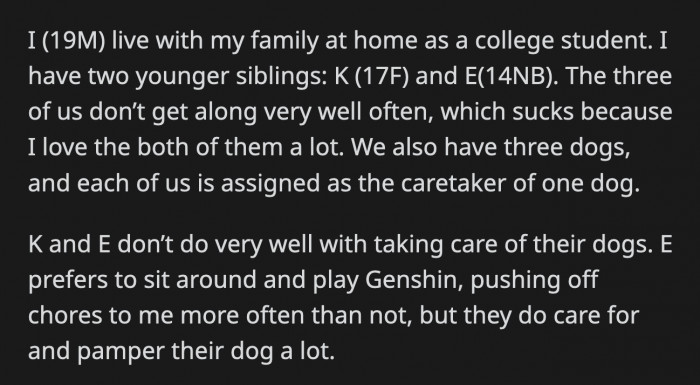
OP Was Supposed to Return to the Vet with Both Dogs but Saw That His Dog's Skin Infection Was Healed
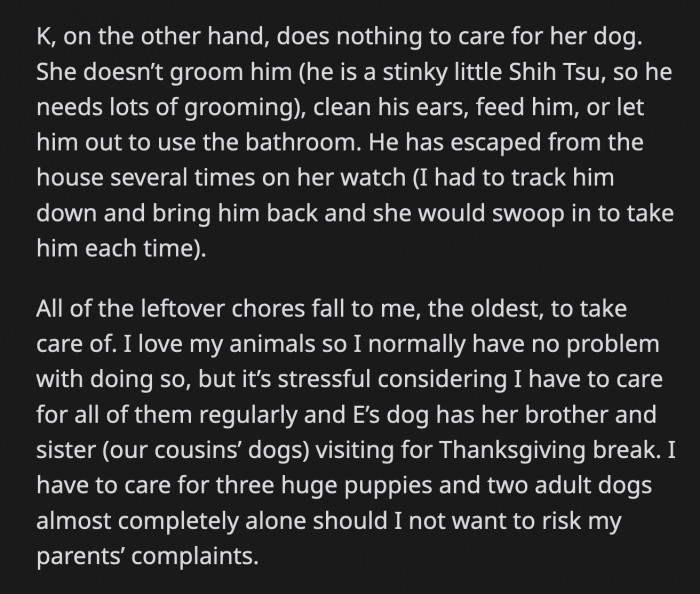
Exploring the Burden of Responsibility on Eldest Siblings
The phenomenon of 'parentification' occurs when children take on adult responsibilities, often seen in eldest siblings. According to Dr. Judith S. Wallerstein, children placed in these roles may experience anxiety and resentment, as their needs for autonomy and childhood experiences are compromised. This pattern can lead to chronic stress and burnout.
In this Reddit scenario, the eldest sibling is overwhelmed with caretaking duties for the family dogs, illustrating how such burdens can strain familial relationships. It's crucial to recognize that while responsibility can foster maturity, it can also lead to emotional exhaustion if not balanced appropriately.
Identifying Parentification in Sibling Roles
Parentification occurs when a child is placed in a role that requires them to take on parental responsibilities, often leading to emotional burdens that are too heavy for their age. Research from the Journal of Child Psychology shows that parentified children can experience increased anxiety and depression as they shoulder responsibilities typically reserved for adults. In this case, the eldest sibling's frustration with caring for the dogs may stem from feeling overwhelmed by expectations that exceed their developmental capabilities.
He Decided to Take the Shih Tzu by Himself but Was Immediately Yelled at by Kate and Eli When He Was Just About to Eat Lunch

They Were Mad at Him for Not Taking Kate's Dog to the Vet at Noon
OP said the dog wasn't his responsibility and that it's ridiculous that he basically had to force her to care about him. OP told Kate he wouldn't take her dog to the vet anymore, but he feels bad for the dog because it's not his fault that his owner is irresponsible.
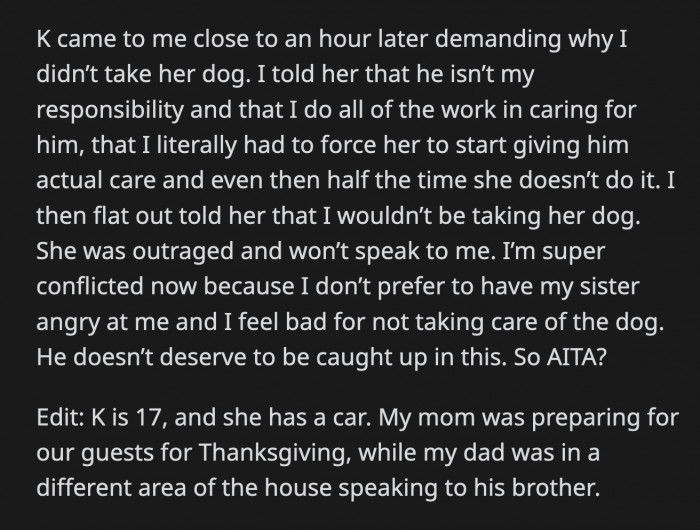
OP Is Right to Say That the Dog Is Not His Responsibility, but If His Sister Continues to Do Nothing, OP Has to Take the Dog to the Vet Because He Doesn't Deserve to Be in Pain
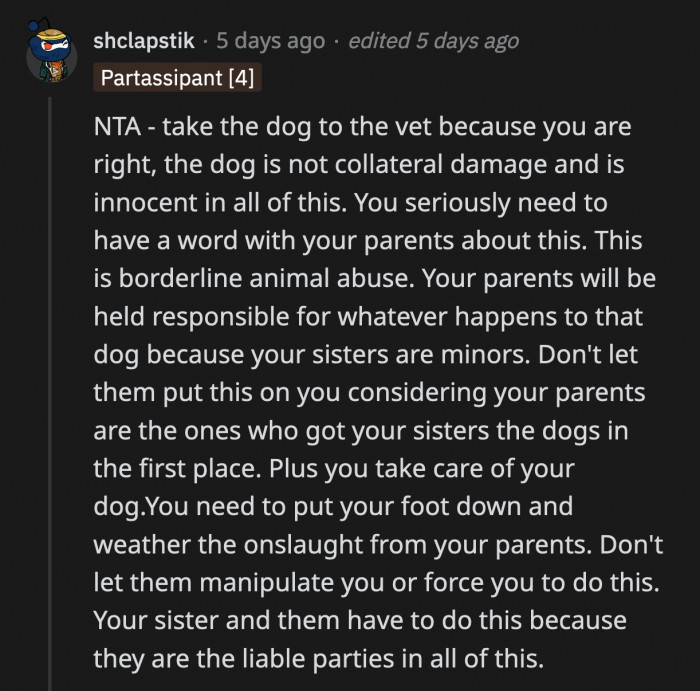
Research in developmental psychology shows that parentification is linked to long-term emotional and psychological outcomes, including difficulties in adult relationships and increased rates of anxiety. A study published in the Journal of Clinical Psychology highlights that these children often struggle with boundary setting in adulthood, as they may have learned to prioritize others' needs over their own.
In this case, the sibling's frustration with their siblings reflects a deeper issue of feeling unrecognized and undervalued, which can lead to resentment.
Psychologists emphasize that parentification can disrupt the natural sibling hierarchy, resulting in resentment and conflict. A study from Yale University found that siblings who experience this role reversal often struggle with boundary issues and may harbor feelings of inadequacy. This may explain why the eldest sibling feels overwhelmed while the others contribute little to the caregiving responsibilities.
OP Has to Get Their Parents Involved Because This Should Not Be His Battle to Fight

Kate Is Just Looking for an Excuse Instead of Doing the Responsible Thing Because She Knows OP Cares About the Dog Too Much to Not Take Him to the Vet
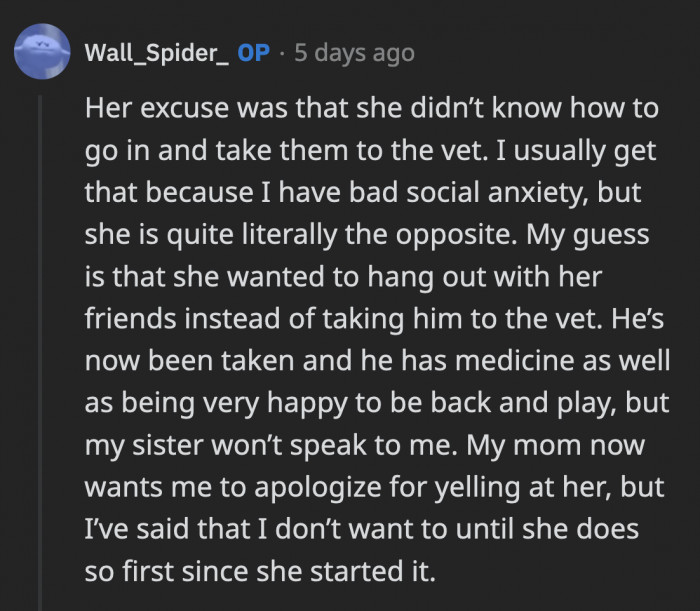
All the Yelling in the House Did Not Alert Them to the Fight Among Their Kids

Strategies for Sharing Responsibilities
To alleviate the burden on the eldest sibling, implementing a family meeting to discuss responsibilities can be an effective approach. Encouraging open communication about workload can foster understanding and teamwork among siblings. Research shows that collaborative problem-solving in family settings can increase cohesion and reduce individual stress levels.
Using tools like a shared calendar or chore chart can also help distribute responsibilities more equitably. This practice not only clarifies expectations but also encourages accountability among all family members.
The Role of Communication in Family Dynamics
Open communication is essential in family dynamics, especially in situations of parentification. Research suggests that families who engage in regular, honest discussions about roles and responsibilities tend to function more harmoniously. The eldest sibling may benefit from initiating a family meeting to express feelings about the unequal distribution of responsibilities. By framing the conversation around feelings rather than accusations, they can foster a more supportive family environment.
OP Said Their Parents Were Preoccupied with Holiday Preparations to Mediate Between the Three

They Have to Address the Problem Now That Thanksgiving Is Done. They Shouldn't Enable Kate's Immaturity and Lack of Responsibility.

They Have Allowed This Mess to Go on for Too Long, and It Is Up to Them to Teach Kate How to Be an Adult
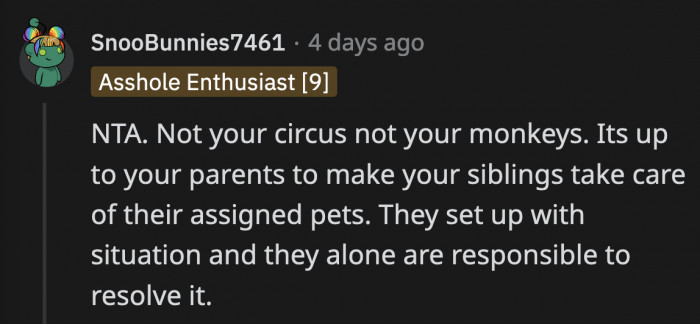
It's essential to validate the feelings of the eldest sibling while also encouraging their siblings to step up. Emotional support from peers can alleviate feelings of isolation and burnout. Studies have shown that peer support can be a significant buffer against the negative effects of stress, promoting resilience in challenging situations.
Additionally, it's important for the siblings to recognize and validate the efforts of the eldest sibling. A study conducted by the University of California, Berkeley, found that acknowledgment from family members can significantly reduce feelings of resentment and improve overall family relations. Simple gestures of gratitude can help create a more equitable atmosphere where all siblings feel valued.
It's Not Right That OP Is Made to Act Like a Parent to Kate and Eli Just to Make Them Take Care of Their Dogs
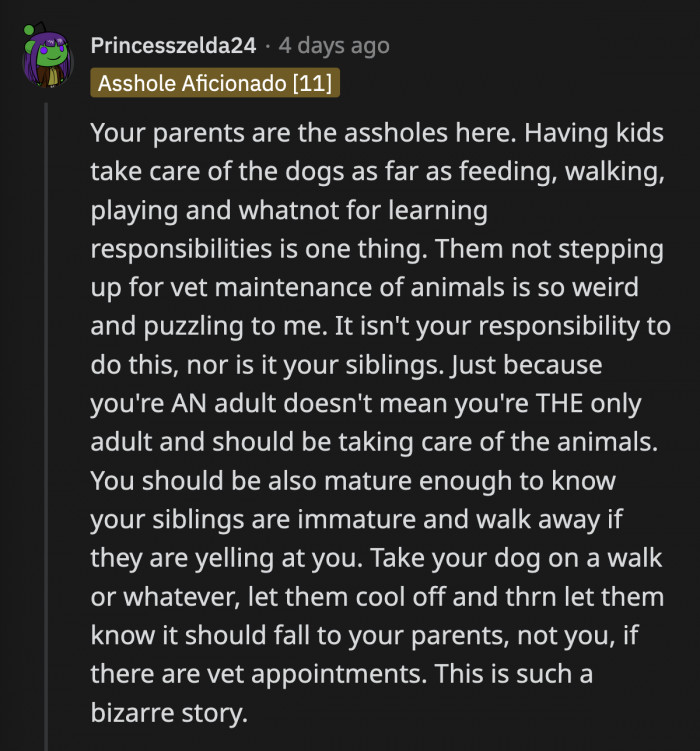
OP Did the Right Thing and Made Sure the Dog's Infection Was Taken Care Of. All Kate Had to Do Was Bring Her Back for a Follow-Up, but She Dragged Her Feet with a Task as Simple as That.
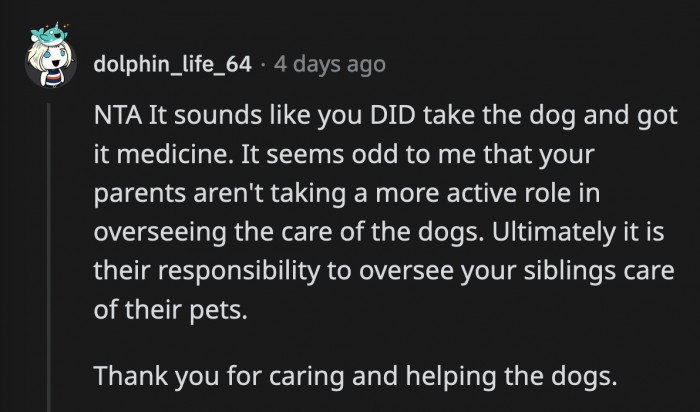
It's easy to tell OP to stick to his guns and bear the scolding his parents might subject him to. He is a college student who lives at home and still depends on his parents for many things.
However, his parents need to realize that they are being unfair. They expect OP to do everything without complaint while they allow Kate and Eli to skate by — the Redditors are right that the parents need to intervene.
Coping Strategies for the Eldest Sibling
To manage the stress of parentification, the eldest sibling can employ coping strategies that promote emotional resilience. Techniques such as journaling or engaging in mindfulness practices can help them process their feelings and reduce anxiety. According to a meta-analysis in the Clinical Psychology Review, mindfulness not only improves emotional regulation but also enhances overall well-being, which could be beneficial for the eldest sibling in this situation.
Psychological Analysis
This situation illustrates the psychological impact of parentification on sibling relationships. The eldest sibling's feelings of frustration and overwhelm are understandable, given the responsibilities shouldered at such a young age. It's crucial for the family to recognize these dynamics and engage in open dialogues about responsibilities to foster a more supportive environment.
Analysis generated by AI
Analysis & Alternative Approaches
In conclusion, the challenges faced by the eldest sibling highlight the complexities of family dynamics, particularly regarding parentification. By fostering open communication and employing coping strategies, the family can work towards a more balanced distribution of responsibilities. Understanding the psychological implications of these dynamics is essential for promoting healthier relationships among siblings.
Analysis & Alternative Approaches
In navigating familial responsibilities, it’s vital to foster open communication and equitable sharing of duties. Research from the American Psychological Association emphasizes that healthy family dynamics rely on mutual respect and understanding. By addressing these issues collectively, families can cultivate a supportive environment that benefits everyone.



